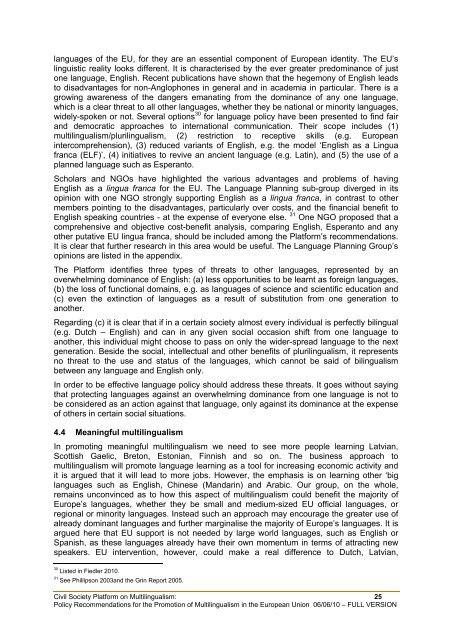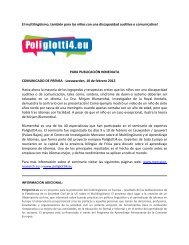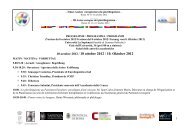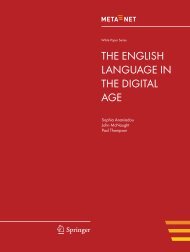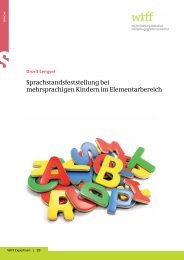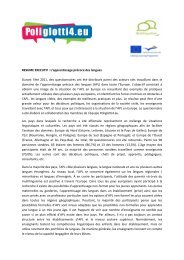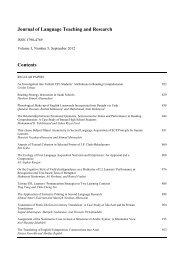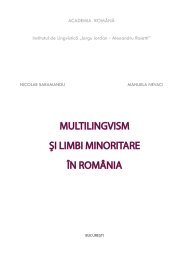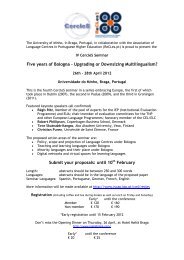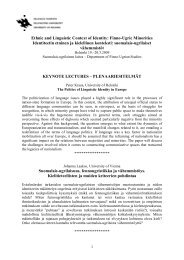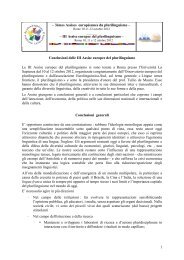FULL VERSION - European Commission - Europa
FULL VERSION - European Commission - Europa
FULL VERSION - European Commission - Europa
Create successful ePaper yourself
Turn your PDF publications into a flip-book with our unique Google optimized e-Paper software.
languages of the EU, for they are an essential component of <strong>European</strong> identity. The EU’slinguistic reality looks different. It is characterised by the ever greater predominance of justone language, English. Recent publications have shown that the hegemony of English leadsto disadvantages for non-Anglophones in general and in academia in particular. There is agrowing awareness of the dangers emanating from the dominance of any one language,which is a clear threat to all other languages, whether they be national or minority languages,widely-spoken or not. Several options 30 for language policy have been presented to find fairand democratic approaches to international communication. Their scope includes (1)multilingualism/plurilingualism, (2) restriction to receptive skills (e.g. <strong>European</strong>intercomprehension), (3) reduced variants of English, e.g. the model ‘English as a Linguafranca (ELF)’, (4) initiatives to revive an ancient language (e.g. Latin), and (5) the use of aplanned language such as Esperanto.Scholars and NGOs have highlighted the various advantages and problems of havingEnglish as a lingua franca for the EU. The Language Planning sub-group diverged in itsopinion with one NGO strongly supporting English as a lingua franca, in contrast to othermembers pointing to the disadvantages, particularly over costs, and the financial benefit toEnglish speaking countries - at the expense of everyone else. 31 One NGO proposed that acomprehensive and objective cost-benefit analysis, comparing English, Esperanto and anyother putative EU lingua franca, should be included among the Platform’s recommendations.It is clear that further research in this area would be useful. The Language Planning Group’sopinions are listed in the appendix.The Platform identifies three types of threats to other languages, represented by anoverwhelming dominance of English: (a) less opportunities to be learnt as foreign languages,(b) the loss of functional domains, e.g. as languages of science and scientific education and(c) even the extinction of languages as a result of substitution from one generation toanother.Regarding (c) it is clear that if in a certain society almost every individual is perfectly bilingual(e.g. Dutch – English) and can in any given social occasion shift from one language toanother, this individual might choose to pass on only the wider-spread language to the nextgeneration. Beside the social, intellectual and other benefits of plurilingualism, it representsno threat to the use and status of the languages, which cannot be said of bilingualismbetween any language and English only.In order to be effective language policy should address these threats. It goes without sayingthat protecting languages against an overwhelming dominance from one language is not tobe considered as an action against that language, only against its dominance at the expenseof others in certain social situations.4.4 Meaningful multilingualismIn promoting meaningful multilingualism we need to see more people learning Latvian,Scottish Gaelic, Breton, Estonian, Finnish and so on. The business approach tomultilingualism will promote language learning as a tool for increasing economic activity andit is argued that it will lead to more jobs. However, the emphasis is on learning other ‘biglanguages such as English, Chinese (Mandarin) and Arabic. Our group, on the whole,remains unconvinced as to how this aspect of multilingualism could benefit the majority ofEurope’s languages, whether they be small and medium-sized EU official languages, orregional or minority languages. Instead such an approach may encourage the greater use ofalready dominant languages and further marginalise the majority of Europe’s languages. It isargued here that EU support is not needed by large world languages, such as English orSpanish, as these languages already have their own momentum in terms of attracting newspeakers. EU intervention, however, could make a real difference to Dutch, Latvian,30Listed in Fiedler 2010.31See Phillipson 2003and the Grin Report 2005.Civil Society Platform on Multilingualism: 25Policy Recommendations for the Promotion of Multilingualism in the <strong>European</strong> Union 06/06/10 – <strong>FULL</strong> <strong>VERSION</strong>


